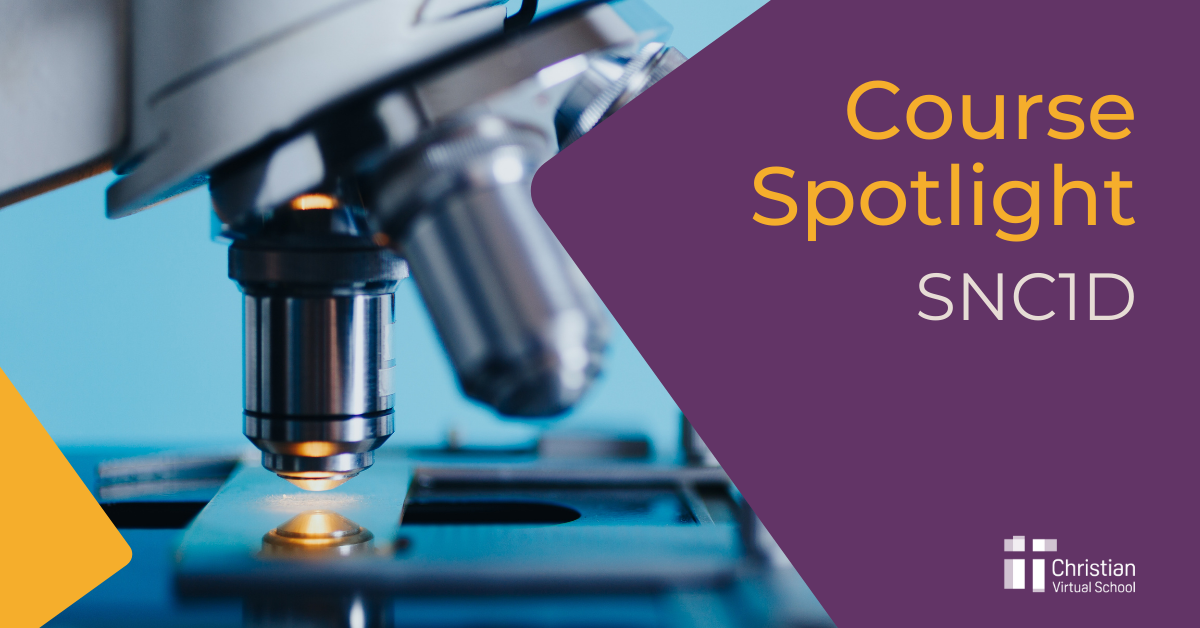
Christian Virtual School’s Grade 9 Science (SNC1D) course covers biology, chemistry, earth and space science, and physics. We know that there are some topics in science that have a tendency to be controversial within the Christian community. For this reason, we focus on helping students develop their critical thinking skills. While each topic is presented from a Christian perspective, our students will learn how to consciously process information, compare it to other information, analyze it, and then actively define what they believe.
The simple believes every word, But the prudent considers well his steps. – Proverbs 14:15 (NKJV)
This course enables students to develop their understanding of basic concepts in biology, chemistry, earth and space science, and physics, and relate science to technology, society, and the environment. Throughout the course students will develop their skills in the processes of scientific investigation. Students will acquire an understanding of scientific theories and conduct investigations related to sustainable ecosystems; atomic and molecular structures and the properties of elements and compounds; the study of the universe and its properties and components; and the principles of electricity. Students will use online simulations through CloudLabs for any experiments or work they would typically do in a science lab.
Course Highlights



Course Breakdown
This course is divided into four units. Each unit begins by introducing students to the Bigger Picture surrounding each topic, to help guide students through the unit from a Christian perspective.
Unit 1 is on Biology and sustainable ecosystems. This unit focuses mainly on ecology, which is the strand of biology that analyzes the relationships between living things and their physical environments. Throughout this unit, students will learn about the different components of an ecosystem, from the plants and animals that live in them, to the soils and water that sustain them. Students will learn about how humans have impacted terrestrial and aquatic ecosystems in both negative and positive ways. Students will begin this unit on the study of living things by first discussing and delighting in the wondrous way in which we, and everything around us, was created by God.
Unit 2 introduces students to the basics of chemistry and to the atom. Students will learn how the elements are organized on the periodic table and how to use this tool. This unit will also teach students about the history of the atomic model and even give them a chance to draw some Bohr-Rutherford diagrams to represent elements. Students will begin this unit by internalizing the scripture Proverbs 25:2, and discuss how they will explore God’s creation at the atomic level.
Unit 3 is on the study of the physical and chemical properties beyond Earth’s atmosphere. Students will learn about the universe and its components, our solar system and its planets, moons, and stars. They will learn how to locate and describe celestial objects in the night sky and understand the current and past cultural and practical value of these objects. Finally, students will study humankind’s attempts to explore space. Students are introduced to this unit by having them think critically about how “the heavens are the work of [His] hands” – Hebrews 1:10 (NKJV).
The final unit, Unit 4, is on physics, the study of consistencies. Students will begin their study of electricity. Students will start measuring factors that are important for describing electricity. Students will understand and describe current, voltage, and resistance and will consider the effects that the human consumption of electricity has on the environment. Students are introduced to this unit by discussing God’s power, and how physics’ main goal is to understand how the universe (God’s creation) behaves.
To learn more about this course, you can view the course outline on our website.




